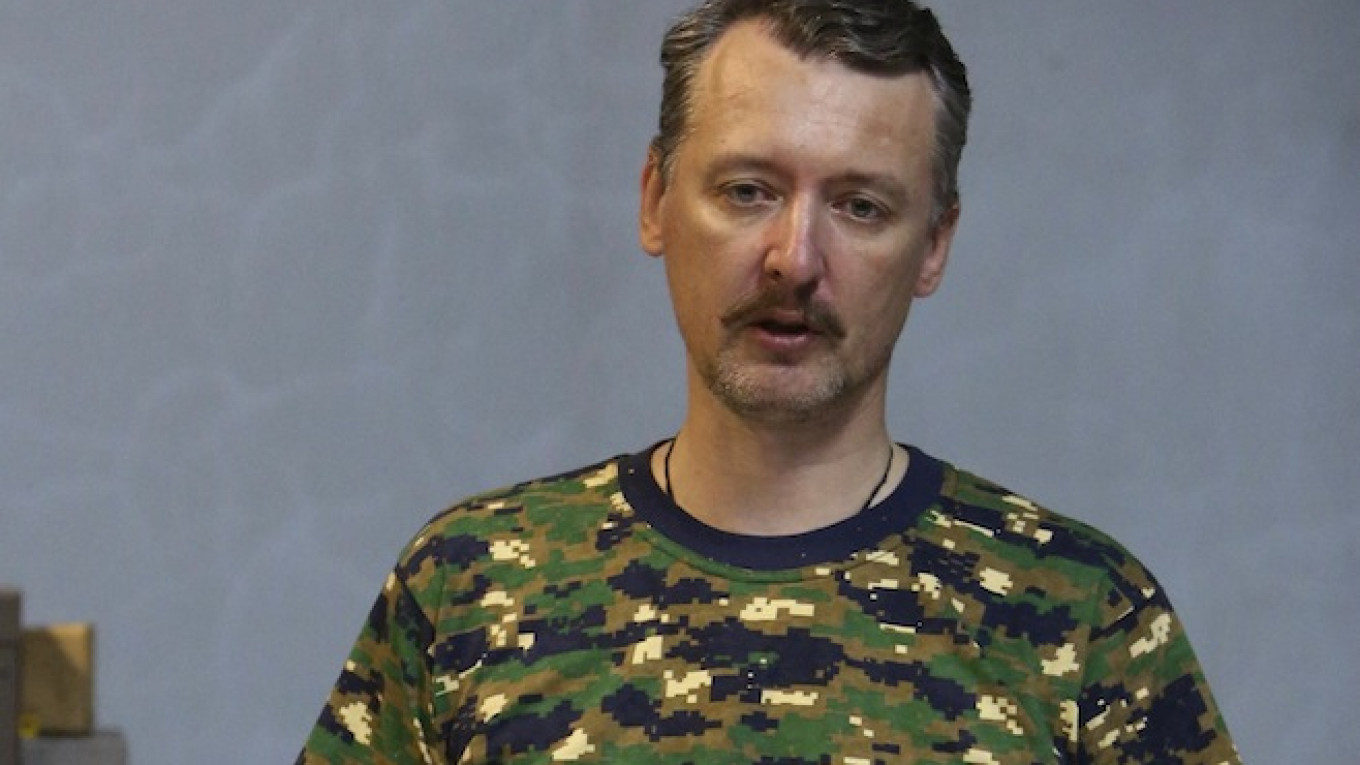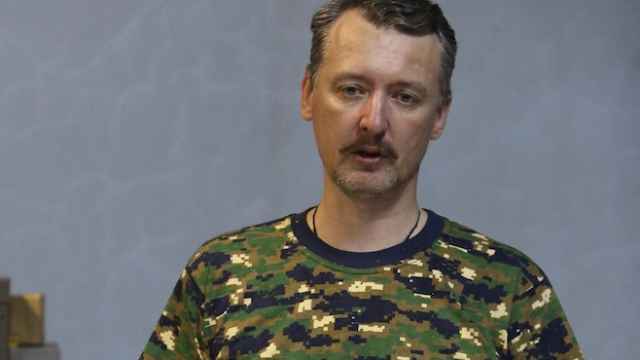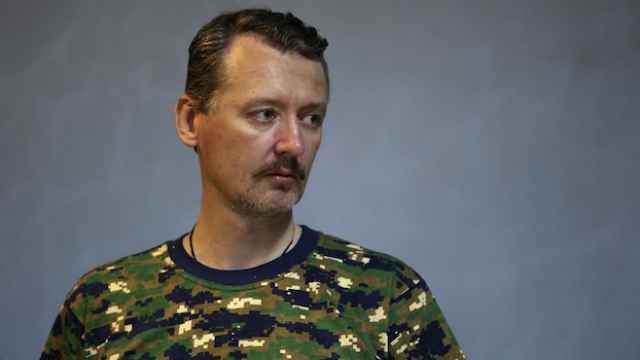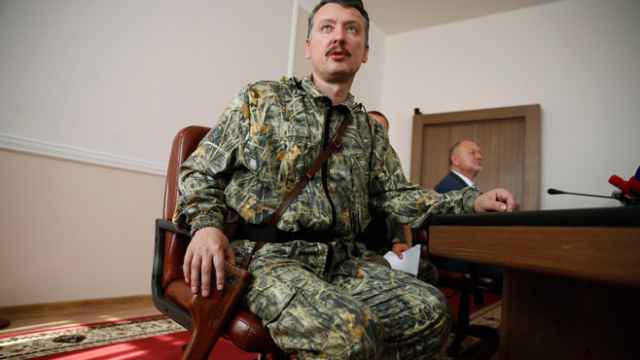Russian national Igor Strelkov, a former commander of pro-Moscow separatists in eastern Ukraine, has claimed personal responsibility for unleashing the conflict in which 4,300 people have been killed since April.
"I was the one who pulled the trigger of this war," Strelkov said in an interview published Thursday with Russia's Zavtra newspaper, which espouses imperialist views.
"If our unit hadn't crossed the border, everything would have fizzled out — like in [the Ukrainian city of] Kharkiv, like in Odessa," Strelkov, who uses that nom-de-guerre meaning "Shooter" to replace his last name Girkin, was quoted as saying.
"There would have been several dozen killed, burned, detained. And that would have been the end of it. But the flywheel of the war, which is continuing to this day, was spun by our unit. We mixed up all the cards on the table," he said.
Following Russia's annexation of Crimea this spring, clashes between pro-Ukrainian and pro-Moscow activists broke out in the cities of Kharkiv and Odessa, with more than 40 people killed in a fire in Odessa in early May.
Since then, the two cities have remained largely peaceful, and most of the fighting between rebels and government forces has been limited to the eastern Luhansk and Donetsk regions.
Strelkov's interview was published the same day the United Nations released a report highlighting the involvement of Russian fighters in the eastern Ukraine conflict, which has resulted in the deaths of more than 4,300 people since mid-April.
"The continuing presence of a large amount of sophisticated weaponry, as well as foreign fighters that include servicemen from the Russian Federation, directly affects the human rights situation in the east of Ukraine," the report said.
Reluctant
Strelkov also told Zavtra that at the beginning of the conflict, Ukrainian separatists and government forces were reluctant to start fighting and that the main opposition to the rebels came from Ukraine's ultranationalist militants such as the Right Sector.
"At first, nobody wanted to fight," he was quoted as saying. "The first two weeks went on under the auspices of the sides trying to convince each other [to engage]."
But Strelkov claimed Kiev became emboldened after seeing that Russia was refraining from openly interfering in eastern Ukraine, as it did in Crimea, or from sending in large-scale forces.
He added that the lack of large-scale support from Russia was a major disappointment for the separatists, who lacked the manpower or weapons to combat government forces.
"Initially I assumed that the Crimea scenario would be repeated: Russia would enter," he told Zavtra. "That was the best scenario. And the population wanted that. Nobody intended to fight for the Luhansk and Donetsk republics. Initially everybody was for Russia."
Russian Involvement
Strelkov also gave an account of the degree of Russia's involvement in the conflict in eastern Ukraine.
At the start of this summer, 90 percent of the rebel forces were made up of local residents, Strelkov was quoted as saying. However, by early August, Russian servicemen supposedly on "vacation" from the army had begun to arrive, he said.
According to Strelkov, the assault on the Black Sea town of Mariupol in September, which prompted concerns in Ukraine and the West that Russia has entered the conflict on a large scale, was conducted mostly by the Russian military "vacationers."
The rebel forces advancing on Mariupol at that time met with little resistance from government troops and "could have been taken without a fight, "but there was an order not to take it," he was quoted as saying.
While Moscow has repeatedly denied supplying the rebels with weaponry and manpower, Strelkov said the assistance offered to rebels remains significant: "I can't say that we fully provide for them. But we are really helping them," he said, noting that half of the rebel army was equipped with winter clothes sent from Russia.
Shock Decision
After Donetsk and Luhansk held "referendums" on their independence from Ukraine in May, separatist leaders appealed to Moscow to accept the territories as Russian regions but Moscow responded with vague statements calling for "dialogue" between rebels and Kiev.
The separatist groups had not contemplated building functional states and had pinned their hopes on being absorbed by Russia, Strelkov said, reasoning that Moscow needed a land connection to Crimea, which it had annexed in March.
"And then, when I understood that Russia was not going to take us in — I associated myself with the resistance — for us that decision was a shock," Strelkov was quoted as saying.
Strelkov has been living in Russia since early this fall, when he said he was moving to Moscow to protect President Vladimir Putin from enemies and traitors.
While he seems to have fallen out of favor with Russia's state-run media, having disappeared from their newscasts, he has taken to YouTube and fringe publication to issue an occasional appeal for increased Russian military involvement in eastern Ukraine.
"From the very beginning we started to fight for real — destroying raiding parties of the Right Sector," Strelkov told Zavtra. "And I take personal responsibility for what is happening there."
According to a UN report released Thursday, at least 4,317 people had been killed in eastern Ukraine by mid-November, and 9,921 wounded. The casualties include nearly 1,000 who have perished since a "tenuous cease-fire" was established earlier this fall, the report said.
Contact the author at [email protected]
A Message from The Moscow Times:
Dear readers,
We are facing unprecedented challenges. Russia's Prosecutor General's Office has designated The Moscow Times as an "undesirable" organization, criminalizing our work and putting our staff at risk of prosecution. This follows our earlier unjust labeling as a "foreign agent."
These actions are direct attempts to silence independent journalism in Russia. The authorities claim our work "discredits the decisions of the Russian leadership." We see things differently: we strive to provide accurate, unbiased reporting on Russia.
We, the journalists of The Moscow Times, refuse to be silenced. But to continue our work, we need your help.
Your support, no matter how small, makes a world of difference. If you can, please support us monthly starting from just $2. It's quick to set up, and every contribution makes a significant impact.
By supporting The Moscow Times, you're defending open, independent journalism in the face of repression. Thank you for standing with us.
Remind me later.






